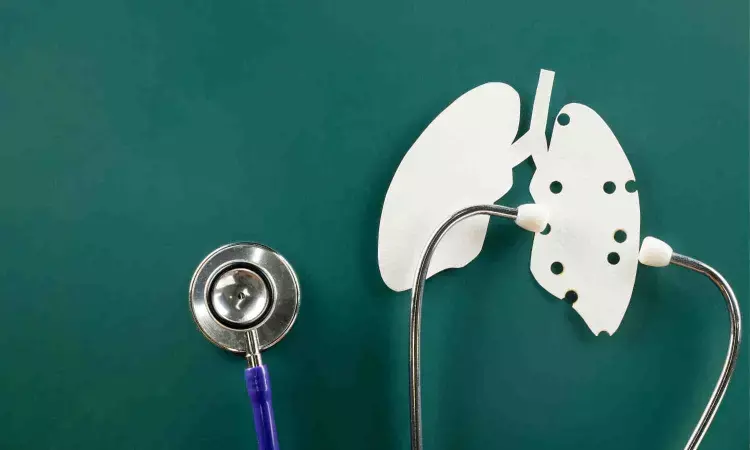- Home
- Medical news & Guidelines
- Anesthesiology
- Cardiology and CTVS
- Critical Care
- Dentistry
- Dermatology
- Diabetes and Endocrinology
- ENT
- Gastroenterology
- Medicine
- Nephrology
- Neurology
- Obstretics-Gynaecology
- Oncology
- Ophthalmology
- Orthopaedics
- Pediatrics-Neonatology
- Psychiatry
- Pulmonology
- Radiology
- Surgery
- Urology
- Laboratory Medicine
- Diet
- Nursing
- Paramedical
- Physiotherapy
- Health news
- Fact Check
- Bone Health Fact Check
- Brain Health Fact Check
- Cancer Related Fact Check
- Child Care Fact Check
- Dental and oral health fact check
- Diabetes and metabolic health fact check
- Diet and Nutrition Fact Check
- Eye and ENT Care Fact Check
- Fitness fact check
- Gut health fact check
- Heart health fact check
- Kidney health fact check
- Medical education fact check
- Men's health fact check
- Respiratory fact check
- Skin and hair care fact check
- Vaccine and Immunization fact check
- Women's health fact check
- AYUSH
- State News
- Andaman and Nicobar Islands
- Andhra Pradesh
- Arunachal Pradesh
- Assam
- Bihar
- Chandigarh
- Chattisgarh
- Dadra and Nagar Haveli
- Daman and Diu
- Delhi
- Goa
- Gujarat
- Haryana
- Himachal Pradesh
- Jammu & Kashmir
- Jharkhand
- Karnataka
- Kerala
- Ladakh
- Lakshadweep
- Madhya Pradesh
- Maharashtra
- Manipur
- Meghalaya
- Mizoram
- Nagaland
- Odisha
- Puducherry
- Punjab
- Rajasthan
- Sikkim
- Tamil Nadu
- Telangana
- Tripura
- Uttar Pradesh
- Uttrakhand
- West Bengal
- Medical Education
- Industry
Fingerprints shall predict regularity of TB patients on antitubercular drugs in future, says study

A fingerprint may soon be all a doctor needs to check whether tuberculosis patients are taking their antibiotics-thanks to a new study led by the University of Surrey.
Scientists successfully detected the drugs in finger sweat-and with almost the same accuracy as a blood test.
Professor Melanie Bailey, an analytical chemist and co-author of the study from the University of Surrey, said:
“Up until now, blood tests have been the gold standard for detecting drugs in somebody’s system.
“Now we can get results that are almost as accurate through the sweat in somebody’s fingerprint. That means we can monitor treatment for diseases like tuberculosis in a much less invasive way.”
Curable tuberculosis (TB) is treated with antibiotics. If patients don’t stick to their full course, the treatment might not work, leading to drug-resistant TB instead.
Scientists wanted to know when was best to test, and whether they could tell how much medication the patient had taken.
To do so, they tested ten TB patients at the University Medical Center Groningen (UMCG), in the Netherlands.
Dr Onno Akkerman, a pulmonary physician with focus on tuberculosis from the UMCG said:
“It was very simple to collect our samples. We asked patients to wash their hands, put on a nitrile glove to induce sweating, and then press their fingertips onto a paper square.
“Finger sweat can be collected without any specialist training. Unlike blood, it isn’t a biohazard, so can be transported and stored much more easily.
“We’re looking forward to working with Surrey to detect other TB drugs using this promising technique.”
The samples were shipped to Surrey’s Ion Beam Centre and they were analysed using mass spectrometry – which breaks the sample down to see what it is made of.
Scientists detected antibiotics in finger sweat with 96% accuracy. The metabolite, produced by actually ingesting the drug, showed up with 77% accuracy.
The drug itself was present between one and four hours after ingestion, while a metabolised version showed up best after six hours.
Dr Katie Longman, co-author of the study from the University of Surrey, explained:
“Doctors need to check whether tuberculosis patients are taking their antibiotics. It's much quicker and more convenient to do that using fingerprints rather than taking blood.
“This could ease the time pressure on a busy health service and offer patients a more comfortable solution.
“For some patients, like babies, blood tests are not feasible or desirable – so techniques like this one could be really useful.”
Reference:
K. Longman, O.W. Akkerman, S. Ghimire, M.S. Bolhuis, M.A. Chambers, M.G.G. Sturkenboom, M.J. Bailey, Measurement of isoniazid in tuberculosis patients using finger sweat with creatinine normalisation: A controlled administration study, International Journal of Antimicrobial Agents, 2024, https://doi.org/10.1016/j.ijantimicag.2024.107231.
Dr Kamal Kant Kohli-MBBS, DTCD- a chest specialist with more than 30 years of practice and a flair for writing clinical articles, Dr Kamal Kant Kohli joined Medical Dialogues as a Chief Editor of Medical News. Besides writing articles, as an editor, he proofreads and verifies all the medical content published on Medical Dialogues including those coming from journals, studies,medical conferences,guidelines etc. Email: drkohli@medicaldialogues.in. Contact no. 011-43720751


